| | | | | | | Presented By Equinor | | | | Axios World | | By Dave Lawler ·Jun 17, 2021 | | Welcome back to Axios World. - Tonight's edition (1,843 words, 7 minutes) looks at China's global influence, Iran's upcoming election and much more.
- It's a beautiful Thursday evening here in Washington, D.C. I hope you have a relaxing weekend ahead.
New Arrival? Subscribe here. | | | | | | 1 big thing: How China's global influence has grown |  Data: Atlantic Council; Map: Andrew Witherspoon/Axios As of 1980, China was the most influential player in just one country: Albania. Now, China is the leading power across most of sub-Saharan Africa and Southeast Asia and is catching up to the U.S. in its own hemisphere. That's according to a new report from the University of Denver and the Atlantic Council that seeks to measure the influence countries have on each other, and in so doing offers a dramatic portrait of China's rise. - The authors took the quantifiable aspects of two countries' trade, security and diplomatic relationships (the value of goods traded, aid provided, arms transferred, etc.) and then looked at the balance in terms of how dependent one country was on another.
- They note that some aspects of influence — the funding of proxy forces, say, or the strength of cultural influences — aren't captured in this data.
- What they do capture is a clear trend over the last three decades: America's global influence has stagnated, Europe's has waned, and China's has rapidly expanded.
Breaking it down: Even in 2000, China ranked as most influential in only a handful of otherwise isolated states like Iran, Myanmar and Sudan. But in the early 2000s, China's influence surged as its economy expanded. - "The way influence works in the international system now is often not focused primarily on military influence, though that remains important," Jonathan Moyer, one of the report's co-authors, tells Axios.
- It's China's role at the center of global trade that generates the bulk of its influence.
The trend: The acceleration of China's influence has slowed in recent years, but there's room to grow in the security sphere, particularly through weapons sales, Moyer says. - America's shift toward protectionism is making it less competitive with China, says Mathew Burrows, another co-author. "The U.S. has bowed out from big regional trade agreements, and that has basically tilted the balance toward China."
State of play: The U.S. remains the most influential power in some 50 countries versus 34 for China, according to the study, including in nearly all of Latin America and in economic heavyweights like India, Japan, Saudi Arabia and Australia. - But based on the current trajectory, the map could look very different in 2040.
- What to watch: The Biden administration has made an early push to engage with Southeast Asia, where the report finds that U.S. and Chinese influence is closely balanced in several countries, including Indonesia, Malaysia, Thailand and Vietnam.
Worth noting: To simplify our map, we colored countries for which the most influential power was France, Germany or the U.K. all as green. - Germany is the most influential country in nearly all of western and central Europe, while France is most influential in several African countries. The U.K. currently ranks as most influential only in Ireland.
|     | | | | | | 2. What to watch in Iran's election | 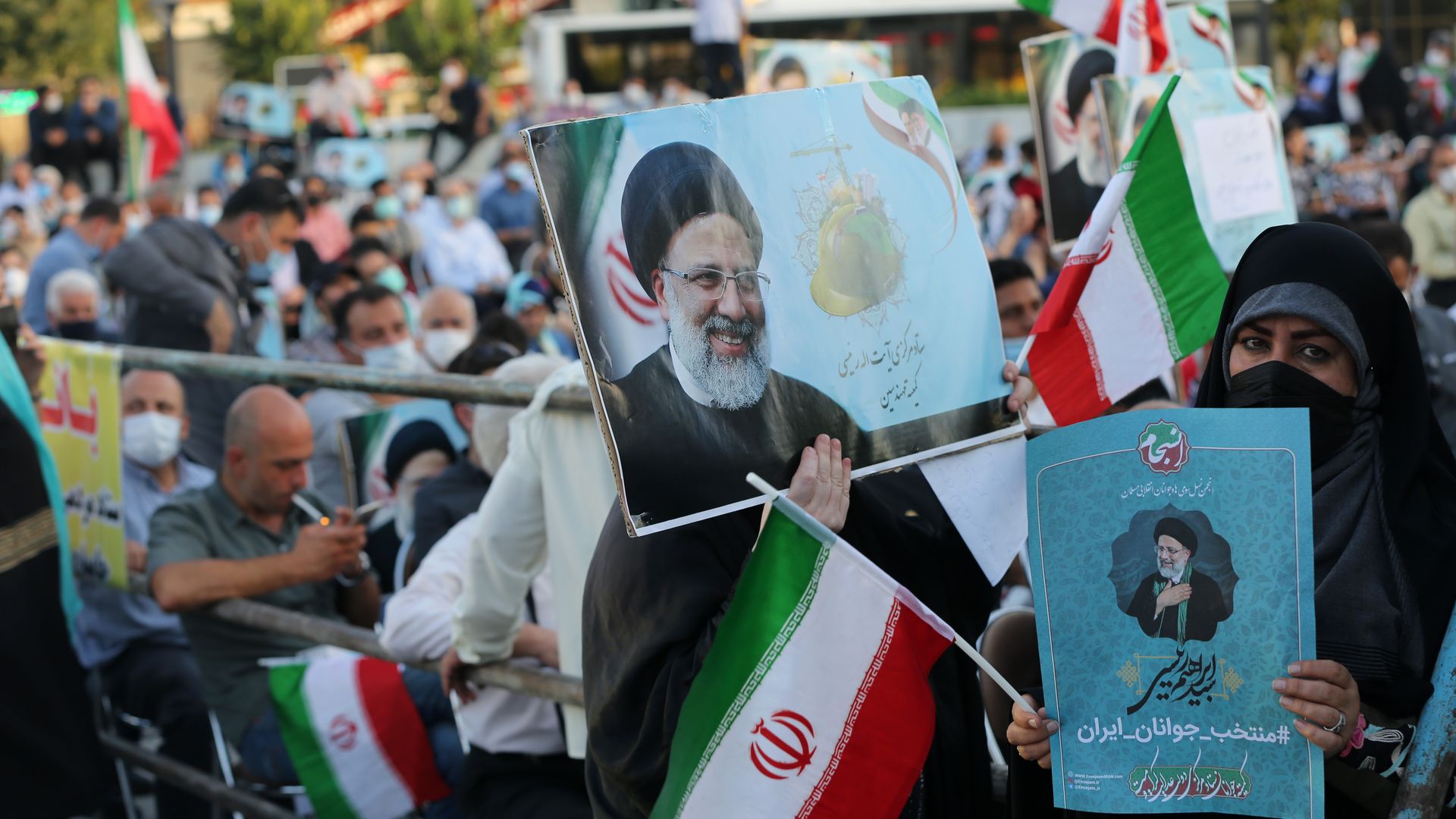 | | | Supporters of Raisi gather in Tehran. Photo: Fatemeh Bahrami/Anadolu Agency via Getty | | | | Iranian Judiciary chief Ebrahim Raisi is the favorite to win Friday's presidential election, a result that would reassert conservative control over all levers of power in Tehran. What to watch: The latest polls in Iran project a very low turnout of around 42% — a testament to the disillusionment of supporters of the reformist camp who find themselves with no candidate to vote for. The backstory: Iran's Guardian Council disqualified all of the prominent reformist candidates, seeming to effectively clear the field for Raisi. - Raisi is a close confidant of and potential successor to Supreme Leader Ali Khamenei. He has the support of most of the conservative camp, including the Islamic Revolutionary Guard Corps, notes Axios' Barak Ravid.
- The main alternative is former central bank governor Abdolnaser Hemmati, a technocrat who is attempting to win the reformist vote by promising a top job to outgoing Foreign Secretary Mohammad Javad Zarif and stressing that he'll prioritize the ongoing nuclear talks.
What's next: "This election is about Khamenei preparing the Islamic Republic's political scene for his departure," emails Behnam Ben Taleblu of the Foundation for the Defense of Democracies. - "A Raisi presidency would ensure stasis, not change," he says, but it would not preclude nuclear diplomacy. "So long as sanctions are maintained and enforced, Tehran has an impetus to talk."
|     | | | | | | 3. Global news roundup | 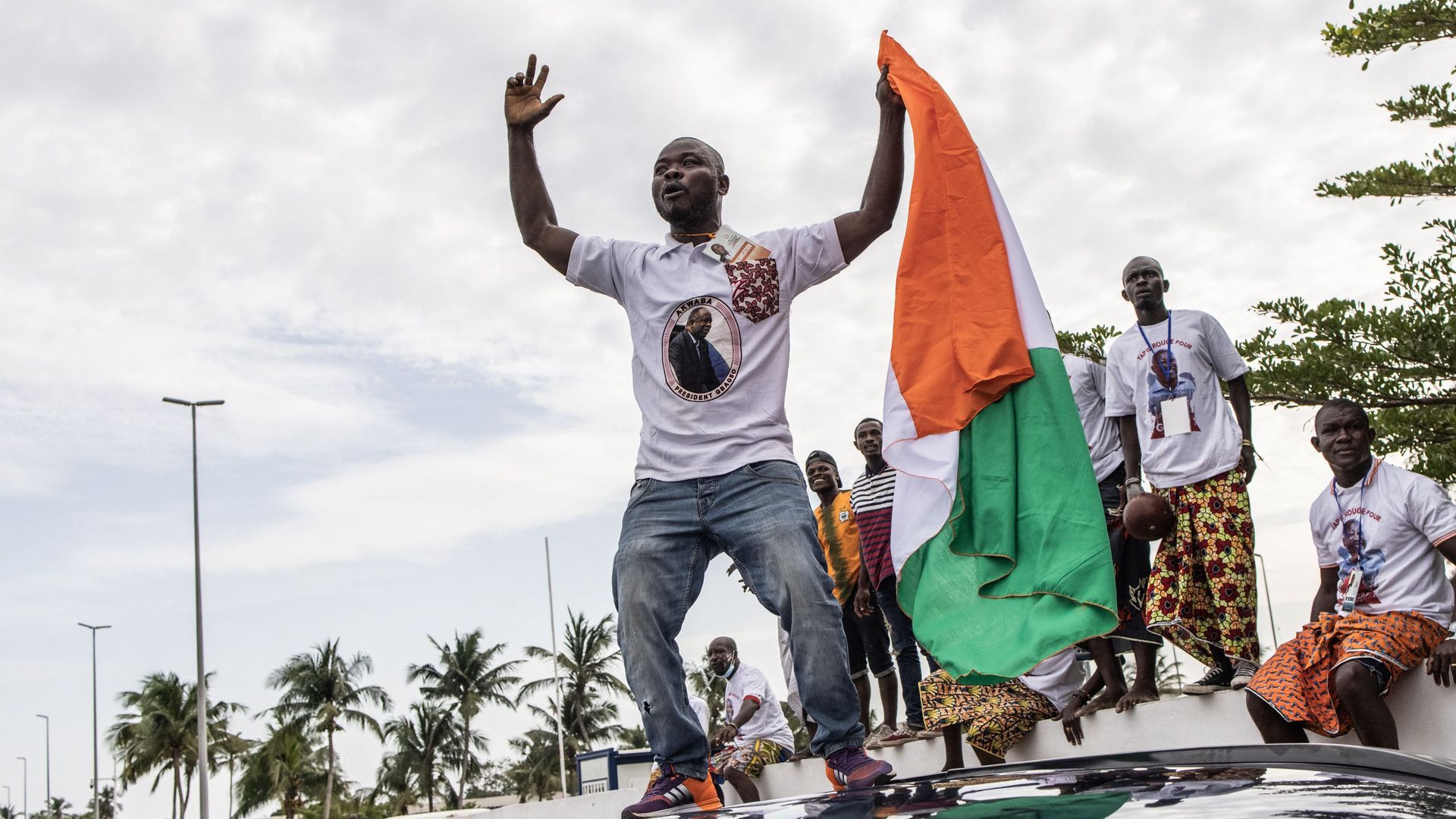 | | | Laurent Gbagbo's supporters gather to welcome him home. Photo: John Wessels/AFP via Getty | | | | 1. North Korean leader Kim Jong-un made a rare acknowledgment of "tense" food shortages in his country, which he said were tied to flooding. North Korea has also closed its borders due to the pandemic, driving food prices higher. - Why it matters: Kim has promised the country increased prosperity but found it hard to deliver.
2. Hong Kong's Apple Daily said 500 police officers searched the pro-democracy newspaper's offices and arrested five senior executives on Thursday. - Flashback: It's easy to forget that not long ago, before Beijing's National Security Law, Hong Kong was a vibrant global hub for the free press.
3. Crowds of supporters greeted Ivory Coast former President Laurent Gbagbo upon his return to the country today after being acquitted of war crimes at The Hague. Some were dispersed by police firing tear gas. - Why it matters: Gbagbo's return could be an opportunity for reconciliation 10 years after he refused to give up power and was ousted in a brief civil war. Or it could drive further conflict.
4. The U.S. and the EU reached a deal to end a 16-year-old dispute over subsidies to Airbus and Boeing. - State of play: Both sides agreed to suspend tariffs for five years while they work together to counter China's investment in the aircraft sector in ways "that reflect our standards for fair competition," U.S. Trade Representative Katherine Tai told reporters.
5. EU member states agreed Wednesday to add the U.S. to a safe travel list, allowing Americans to travel to the bloc for nonessential reasons. |     | | | | | | A message from Equinor | | How one company is helping speed up the energy transition | | | 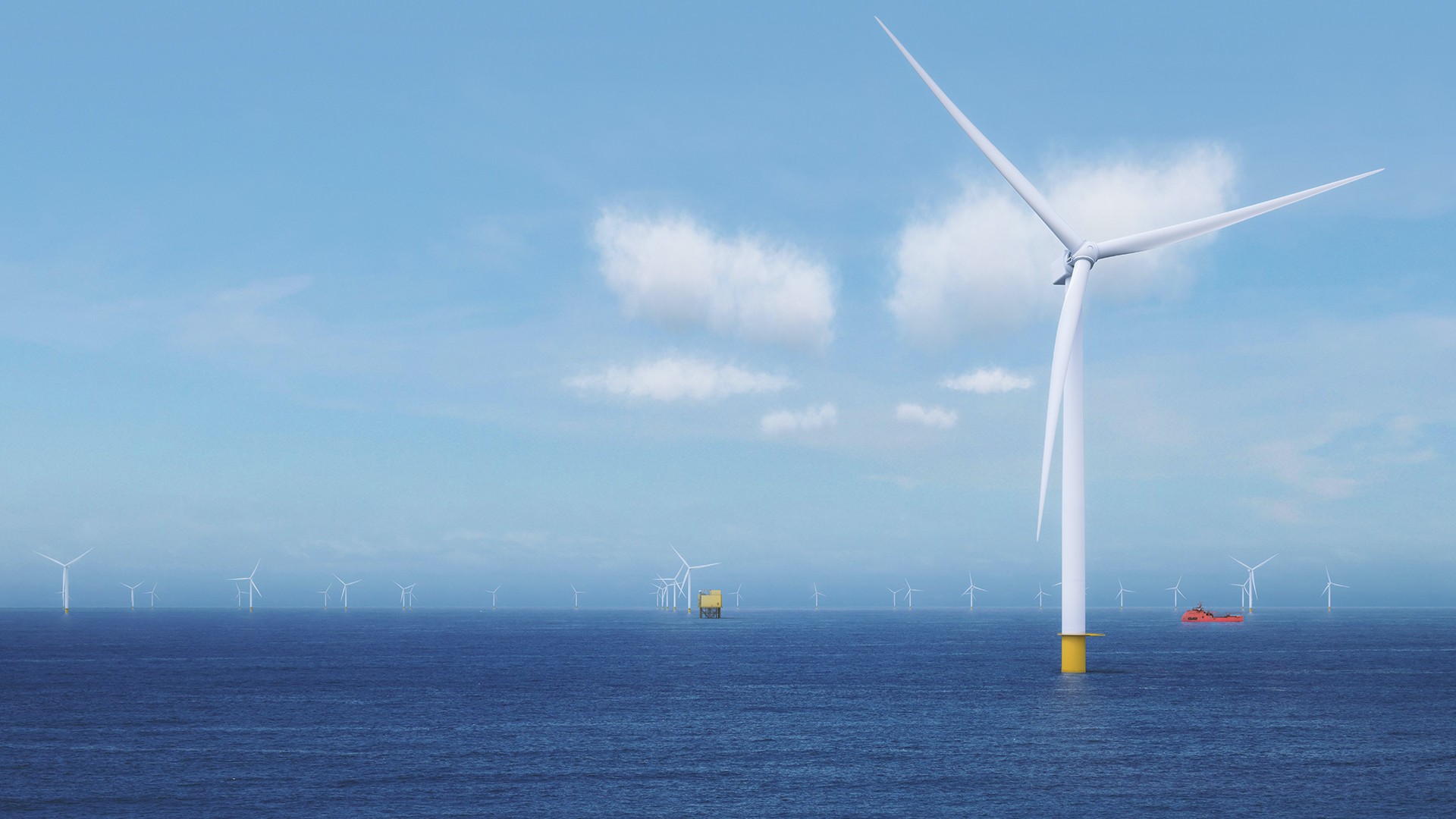 | | | | Equinor plans to power more than 1,000,000 homes in New York with homegrown, renewable energy. Why it's important: With a net-zero target for 2050, Equinor is pursuing the development of offshore wind projects in the U.S. and becoming a leader in the country's growing offshore wind industry. | | | | | | Bonus: Where in the World? | 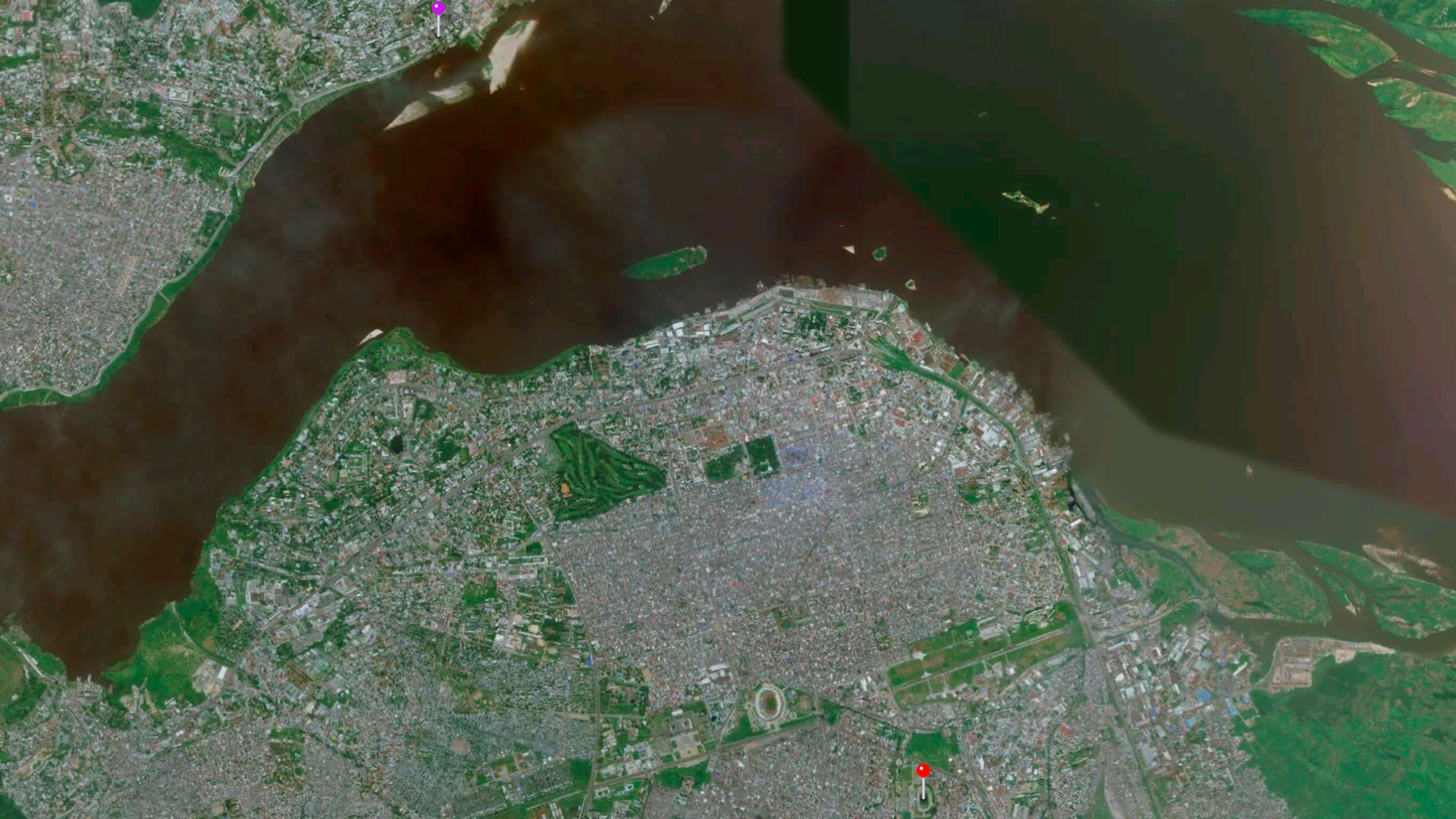 | | | Screengrab via Apple Maps | | | | We're visiting two capital cities today (marked by the red and purple pins) separated by one of the world's largest rivers. That's not much to go on, so I'll give you several clues: - The red pin is located in the largest French-speaking city in the world.
- That same red pin marks the site of a legendary boxing match, held in 1974.
- If I told you the name of the river, it would give away the names of both countries.
Can you name the two cities? Scroll to the bottom for the answer, and thanks to Gary K for the suggestion. |     | | | | | | 4. Data du jour: Corruption concerns rising in EU |  | | | Anti-corruption protests in Bulgaria last October. Photo: Artur Widak/NurPhoto via Getty Images | | | | Corruption is a growing concern for voters in Europe, with respondents across the 27 EU member states twice as likely to think it's getting worse (32%) in their country than getting better (16%), according to a Transparency International survey. Breaking it down: As you move south and east, the concerns grow more acute, Axios fellow Teodora Trifonova writes. - Huge majorities in countries like Croatia (92%), Bulgaria (90%) and Slovenia (84%) view corruption as a big problem versus 16% in Finland and 12% in Denmark. Respondents in Central and Eastern Europe tend to think that corruption is getting worse or at best staying the same, per the poll.
- Zoom in: In Bulgaria, often ranked as the EU's most corrupt member, 48% of respondents said graft was growing worse, 19% paid a bribe to obtain a public service over the past year, and 17% said they knew someone who had been asked for sex to obtain an essential service.
Driving the news: The Biden administration used its first major anti-corruption action earlier this month to target six Bulgarian power brokers and 64 companies linked to them for sanctions — effectively stepping onto the EU's turf to do so. - A week later, European Chief Prosecutor Laura Codruța Kövesi arrived in Bulgaria for her first mission abroad since her office was launched at the start of the month.
- She urged Bulgarians to report serious corruption-related crimes to a newly created EU body empowered to prosecute suspected perpetrators.
What to watch: The concerns about corruption have major political implications. A new anti-establishment party with a focus on fighting corruption just took a narrow lead in the polls ahead of Bulgaria's parliamentary elections on July 11. |     | | | | | | 5. Bennett's plan for dealing with Biden | 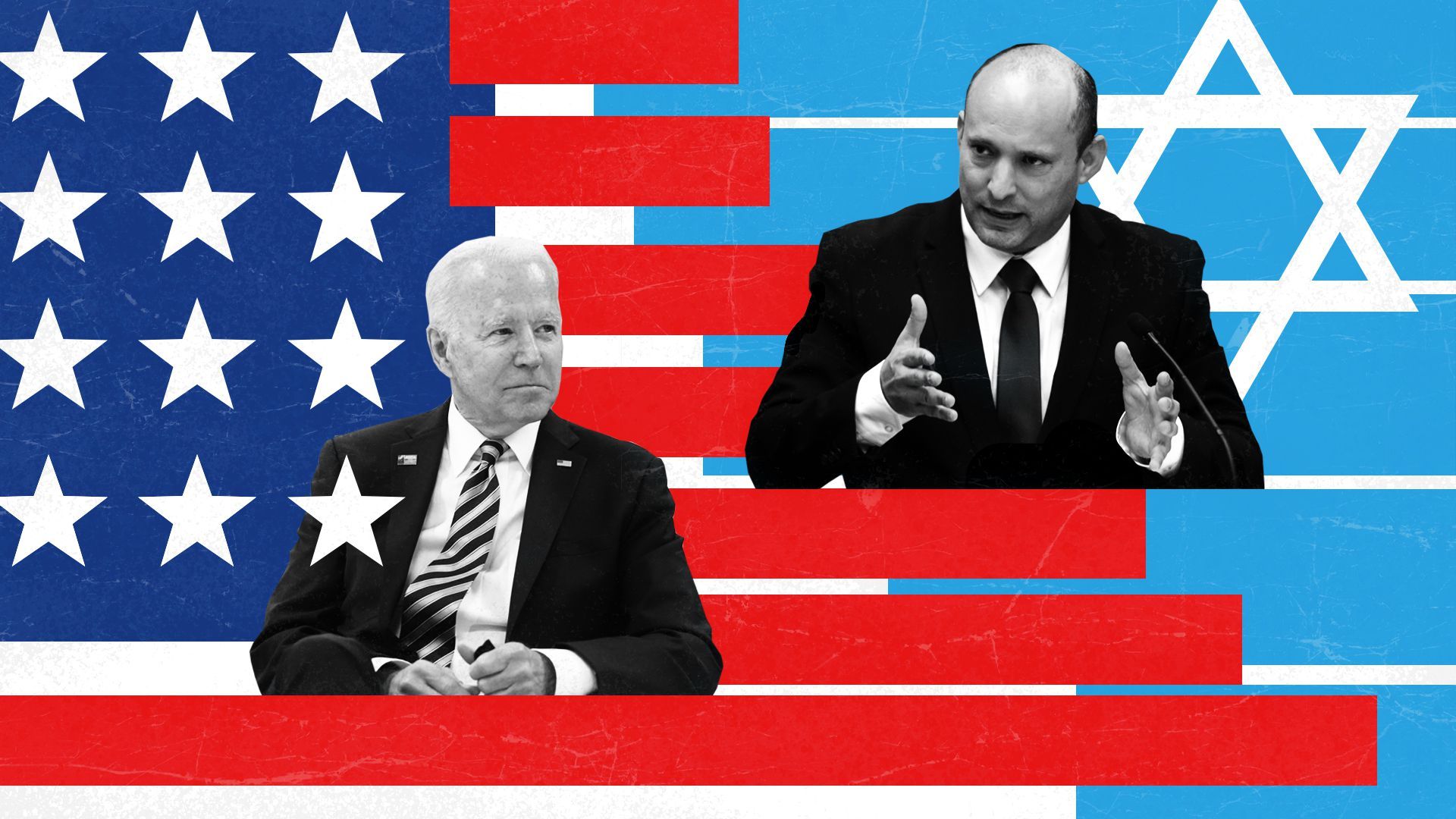 | | | Photo illustration: Shoshana Gordon/Axios. Photos: Stephanie Lecoq/Pool/AFP, Amir Levy/Getty Images | | | | New Israeli Prime Minister Naftali Bennett is signaling he intends to move cautiously at first on issues like Iran and the Israeli-Palestinian conflict, an approach that will suit the Biden administration just fine, Axios' Barak Ravid writes from Tel Aviv. Why it matters: Bennett is aiming to avoid an early confrontation with the U.S., and his fragile and ideologically diverse government will have a hard time taking any groundbreaking steps on foreign policy in the first place. - The Biden administration is also planning to take it slow, avoiding any big initiatives that could destabilize the new government, a U.S. official tells Barak.
The backstory: Bennett has presented hawkish views on Iran and the Palestinian issue throughout his political career, supporting an increase in Israeli military strikes against Iranian forces and proxies, backing settlement expansions, and even calling for the annexation of most of the West Bank. - But he will have a hard time implementing those policies as the leader of a broad power-sharing government.
- Bennett presented an Iran policy similar to Benjamin Netanyahu's in his swearing-in speech, but he said he'd pursue it in a less confrontational style than his predecessor.
- He and Foreign Minister Yair Lapid have both stressed the need to mend fences with Democrats in Washington.
Go deeper: Palestinian leaders wary of Bennett but happy to see Netanyahu go |     | | | | | | 6. Biden and Putin: They met. Now what? |  Data: U.S. Department of State; Chart: Andrew Witherspoon/Axios Biden says it'll be at least six months before he can determine whether yesterday's summit yielded any positive returns, but in his telling at least, Vladimir Putin returned to Moscow with a clearer sense of the potential consequences if Russian hackers strike critical U.S. infrastructure or if Alexei Navalny dies in jail. - In his post-summit press conference, Biden said he'd asked Putin, "How would you feel if ransomware took down the pipelines from your oil fields?"
- Growing agitated with questions about the fact that Putin seemed undeterred in his own lengthy press conference, Biden snapped at a reporter and then offered a revealing comment before boarding Air Force One: It's good to be realistic, Biden said, but also to "put on an optimistic face."
State of play: Biden returned from his week of European summitry last night while two advisers stayed behind to brief allies on the meeting with Putin. National security advisor Jake Sullivan told reporters today that Biden had arrived back in Washington as "the consensus leader of the free world." What's next: Sullivan was asked whether Biden would now hold a similar summit to clear the air with China's Xi Jinping. - There are no specific plans, Sullivan said, but "I would note that both leaders are likely to be at the G20 in Italy in October."
|     | | | | | | 7. Stories we're watching | 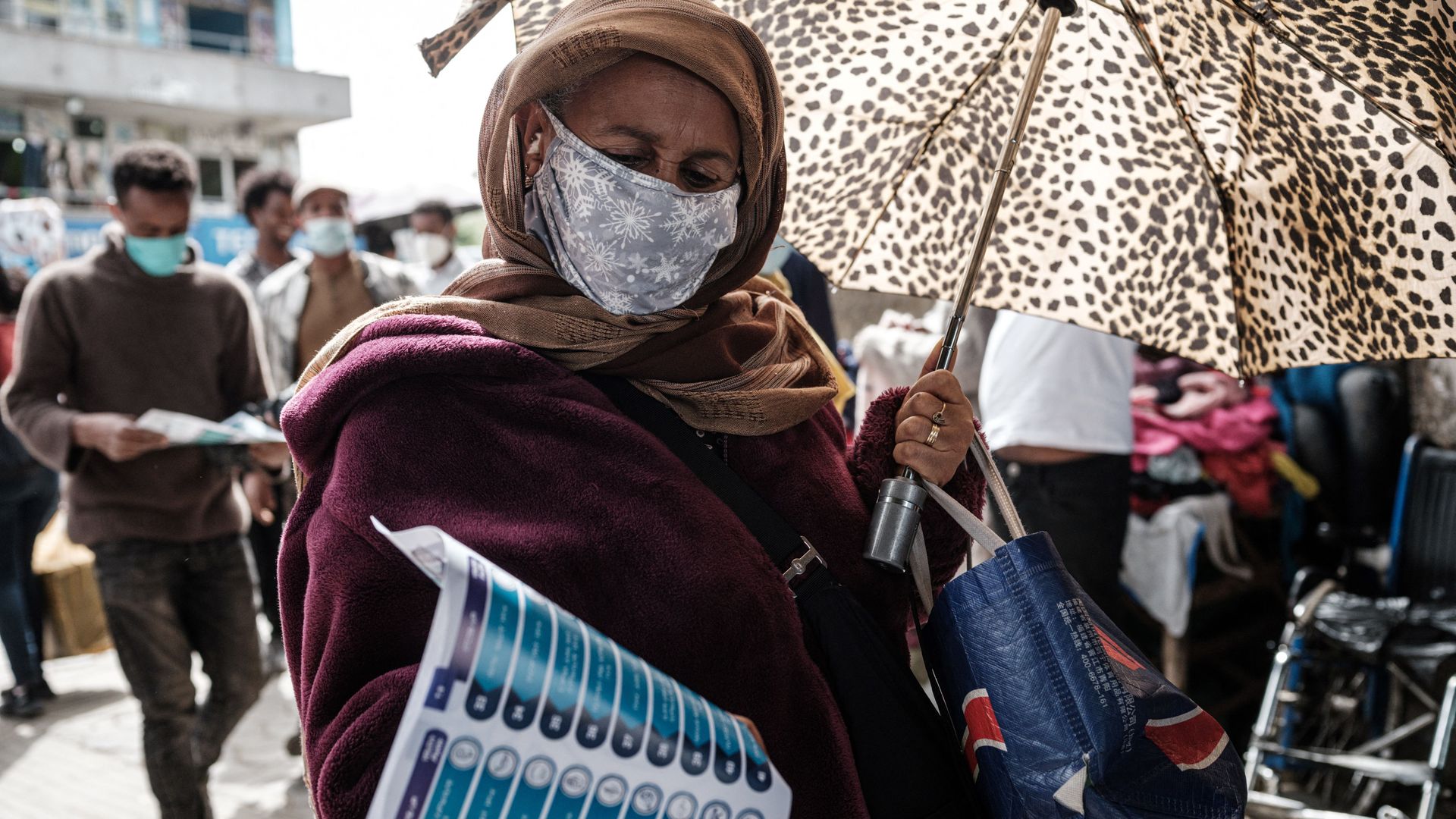 | | | Studying the party list in Addis Ababa before Ethiopia's long-delayed general election on Monday. Photo: Yasuyoshi Chiba/AFP via Getty | | | - Biden names first political ambassadors
- House votes to repeal 2002 Iraq AUMF
- ICC seeks probe into Duterte's drug war
- World Bank rejects El Salvador's request on bitcoin
- French wine disaster points to climate change
- Japan eases COVID restrictions ahead of Olympics
- China sends 28 planes over Taiwan airspace
Quoted: "Agua." — Soccer star Cristiano Ronaldo's message as he removed two Coca-Cola bottles that had been placed in front of him before a press conference and told viewers to drink water instead. Coke's share price slumped after the viral moment. |     | | | | | | A message from Equinor | | Equinor aims to accelerate the energy transition | | |  | | | | The world needs energy — but it must be affordable, reliable, and accessible. What Equinor is doing: Growing their portfolio in renewable energy and cutting emissions. They're also planning to power over 1,000,000 homes in New York with renewable energy. More about Equinor. | | | | Answer: Kinshasa, Democratic Republic of the Congo (red pin) and Brazzaville, Republic of the Congo (purple pin), just across the Congo River. The boxing match was the Rumble in the Jungle. |  | | The tool and templates you need for more engaging team updates. | | | | | | Axios thanks our partners for supporting our newsletters. If you're interested in advertising, learn more here.
Sponsorship has no influence on editorial content. Axios, 3100 Clarendon Blvd, Suite 1300, Arlington VA 22201 | | | You received this email because you signed up for newsletters from Axios.
Change your preferences or unsubscribe here. | | | Was this email forwarded to you?
Sign up now to get Axios in your inbox. | | | | Follow Axios on social media:    | | | | | |












No comments:
Post a Comment